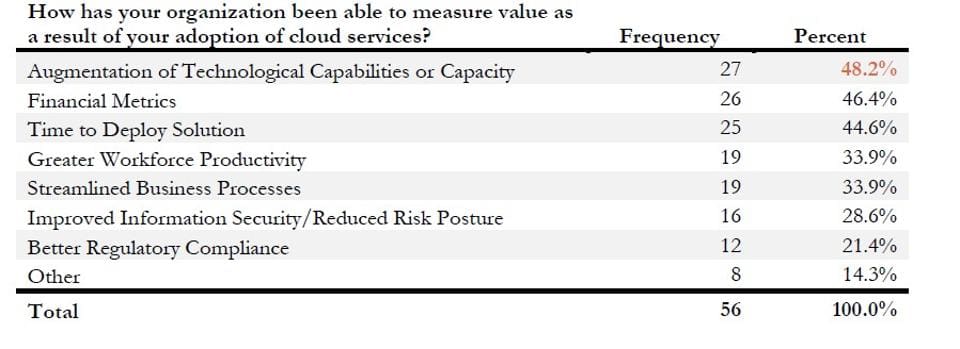Whether it is due to regulators, patients or providers, the medical industry faces constant pressure to do more with less. Other industries facing similar pressures are mostly running their work on ‘cloud,’ allowing their team on-demand access to shared computing resources. In order to meet their business objectives, companies running on cloud see increased agility, lower costs, and over all improved tech-ability. Given the recent pressure put on the healthcare industry, should they really be provided with a healthy dose of cloud computing?
We think the answer would be ‘yes,’ since the major benefits of cloud computing match with the demands that health care IT departments are being asked to fulfill. The healthcare IT divisions can shake-off the burden of supporting on premise applications by utilizing cloud-based platforms like Google, Workday, Force.com and Amazon; not directly affecting patient care.
IT health-care stats

Recently HIMSS Analytics’, a subsidiary of the Health Information and Management Systems Society, released a survey of cloud adoption in healthcare provider organizations, discovering that 83 percent of tech-executives admit to using cloud services in present time.
This data, however, needs to be considered informational rather than representative of the whole industry, since the sample population of medical organizations not using cloud services is small. The methodology might have limitations, but the findings do provide a glimpse into how medical industries are switching their applications to cloud.
One key takeaway from the survey suggests that while 6 percent of healthcare organisations have no intent of adopting cloud-based applications, 92 percent of med-providers now and in the future, see the value of cloud services for their business.
Why medical apps are shifting to the cloud
The reason for the shift is quite simple; an increased need for efficient and better healthcare systems. According to a study, one of the many medical fields in which cloud-based software has crucial presence is cardiology. This particular branch of medicine is one that certainly benefits from retrieval systems and efficient data storage, especially in tasks such as accessing current and historical data.
Mentioned ahead is a list of ‘pressures’ put on medical care IT professionals in order for them to scavenge for cloud-based solutions in today’s healthcare environment.
- IT: simplified
Admittedly, large IT resources and technical expertise are required for running a large healthcare company, distracting a business from its main focus of providing cutting-edge healthcare to patients. In Joel Taylor’s case, New Jersey’s CarePoint Health’s senior vice president and chief information officer, Dell manages all the back-end requirements which makes it cheaper for the company to run its business. Instead of making capital investments, he simply pays a monthly fee, with Dell using that money to keep CarePoint’s cloud operations runny aptly.
- Stronger security
Security and compliance is paramount in the medical industry. It can be both detrimental to both the patient and the company, if the wrong individual gets their hands on healthcare records. According to Taylor, each medical record is worth around 50 to 75 cents to criminals who are always trying to get this information.
CarePoint has used a number of varying services such as firewall protection and virus software, to keep hackers out. While these services were highly workable, they were not as cutting edge as the cloud-solutions that Dell provides its clients.
- The importance of correct records
Within the healthcare industry, the importance of providing patients with the correct information and records is widely understood. Additionally, the information needs to be available at any time or place by anyone providing care. Cloud technology, from a number of secure endpoints, provides flexibility of accessible data. Information continuity is most effective when it’s accessible to the right people – whether it’s from the examining room, to operating rooms or rehab centres.
- Accessing information anywhere
Health care ‘app’ collaboration used to be similar to sending email alerts to the med-authorities, notifying about a new patient being added into the system. At present day, it is has taken on a new meaning, focusing on shared experiences that increase information accuracy all over patient health care. Along with a working internet connection, cloud-based platforms allow collaboration in real-time from any device. Multiple medical care providers can update their electronic health records, with that system being traced back to their original creators. This makes the information thorough and more readily available.
- Elimination of maintenance fees
The elimination of maintenance fees is another major reason why medical applications are shifting to cloud. Usually the storage companies are known for charging 20% of the total sale price for annual maintenance. You’re talking about perhaps $100,000 per year in maintenance bills alone.
Despite, the warranty periods, one does have to pay the purchase price for this upfront. The expiration date, however, comes around fairly quickly, with factor in power, cooling and the extended costs of IT service providers to manage that onsite storage. Health care professionals, after all, only want to focus on the betterment of their patients–not having to continuously deal with their IT infrastructure challenges.
- Quick data recovery
If, say, a fire was ever to ravage your company’s building, all information kept on in-house servers could easily get destroyed. When you tend to store data in the cloud, it’s backed up on multiple servers. The data can be easily recovered, if a natural disaster or hardware failure is ever to occur.
Joel Taylor points out that Dell keeps CarePoint’s data on numerous domains/centres across the region, so if any one server is to crash, the health care company’s information is still recoverable. Every professional carer, according to Taylor, should be aware of finding a company that completely understands the health care industry. For him, Dell has been a great a partner, since it is highly entrenched in the sector.
All in all
The technology complimenting the medicinal field will continue to emerge with on-coming innovations. Health care administrators, nursing, doctors, and all kinds of medical technology staff need efficient healthcare IT. The slow and steady bend towards cloud-base solutions can only benefit the medical industry as a whole.
ABOUT THE AUTHOR
 Alycia Gordan is a freelance writer. She loves to read and write article related to health and lifestyle, sometime on health-tech as well. She is crazy about chocolates and you can find her on Twitter.
Alycia Gordan is a freelance writer. She loves to read and write article related to health and lifestyle, sometime on health-tech as well. She is crazy about chocolates and you can find her on Twitter.

